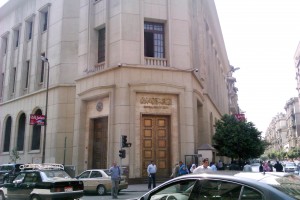
(Abdelazim Saafan/DNE Photo)
Budget transparency and changes in monetary and fiscal policy were among the recommendations for aiding the Egyptian economy, according to research released by the Egyptian Initiative for Personal Rights (EIPR), an independent rights organisation.
The research, titled The Illusion Dispelled, was focused on identifying the economic predicaments and policy shortcomings that lead to the national economic crisis.
Mohamed Mossallen, the foreign trade and trade program officer at the Economic and Justice Unit, mentioned in the report that the post-revolution economic strategy was mainly “focused on financing an expanding budget deficit and stabilising the Egyptian pound in the face of a growing balance of payment deficiency.”
Focusing on the post-revolution monetary and fiscal policy and lack of budget transparency, the report discussed the decision-making shortcomings.
The Central Bank of Egypt spent over $20bn attempting to stabilise the local currency. Additionally, consumption of reserves continued, at a rate of $1.4bn per month, and the bank resorted to bond sales and foreign deposits. However these approaches failed to save the foreign reserves.
“The central bank reacted by adopting the new auction mechanism to buy and sell dollars. However, the bank’s desperate attempts to introduce restrictions on foreign capital outflows through restricting individual foreign currency transfers and corporate withdrawals were too little too late,” the report explained.
“The government’s earlier reluctance to adopt more stringent capital controls for fear of sending a negative message to potential investors and international financial bodies were a mark of poor economic decision making,” the report added.
The report also stated that expectations for the budget deficit to reach more than EGP200bn, almost 13% of GDP, were unsurprising, and placed the blame on ousted president Mohamed Morsi’s government for the delay in taking decisions regarding energy subsidies as well as its “reluctance to implement measures like public sector wage caps and progressive taxation; any discussion by government officials over limited policy space has to be seen as self-inflicted.”
Several suggestions were offered to ameliorate the economic crisis.
The study cites the United Nation Development Programme’s report on “Arab development challenges” as a fiscal and monetary policy improvement manual.
For budget transparency, the report suggested referring to the open budget survey’s recommendations such as a pre-budget statement, which would be aimed at providing information that links government policies and budgets, and typically would put forth the broad parameters that will define the budget proposal that is presented to the legislature.
Another proposal was to create a “citizens budget,” a nontechnical presentation to enable broad public understanding of the government’s plans for raising revenues and spending public funds in order to achieve policy goals.
“Another crucial recommendation is empowering the supreme audit institution and publishing its report, which is currently only published internally,” the report added.
The report also focused on the idea of designing and launching a long term industrial policy
“Egypt’s economic future depends on launching a new phase of industrialization based on increased competitiveness, enabling it to deviate from its current rentier model to a more competitive and sustainable model of economic growth,” it said.



